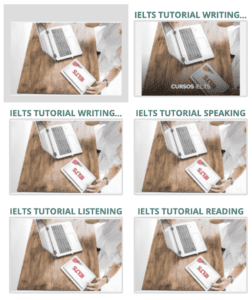Seminar
HOW TO TEACH IELTS
$ 240,000
\
HOW TO TEACH IELTS – ONLINE COURSE
How to teach IELTS offers teachers the tools to start preparing students for the IELTS EXAM and the material you need for your classes in pdf and interactive format
Interactive material and links
Downloadable files and lesson plans
Recorded classes available on our campus 24/7
ONE TIME PAYMENT
-
Interactive material and links you can use in your class for 6 months
-
Downloadable files and lesson plans you can keep
-
Recorded classes and available on our campus 24/7 of the complete Seminar
-
Ask questions using the chat box available 24/7
-
Optional Q & A Meeting with expert: Marcela Ardohain: This meeting is scheduled every month and it is optional. It is also recorded and sent upon request (subject to attendance)
-
Option to extend the subscription for 6 months + half the price
-
Extra: Buy a subscription for more material for the IELTS 4-module interactive course divided in levels (more than 60 hours of material per level)
#How to teach IELTS Buenos Aires
#How to teach IELTS Argentina
#How to teach IELTS Online
#How to teach IELTS Latin America:
#How to teach IELTS Peru
#How to teach IELTS Colombia
#How to teach IELTS Ecuador
#How to teach IELTS Republica Dominicana
#How to teach IELTS Mexico
Los cursos IELTS Online se pueden tomar en todo el mundo:
# Curso IELTS Buenos Aires
# Curso IELTS Argentina
# Curso IELTS Online
# Cursos IELTS Latin America:
# Cursos IELTS Peru
# Cursos IELTS Colombia
# Cursos IELTS Ecuador
# Cursos IELTS Republica Dominicana
# Cursos IELTS Mexico
- Description
- Who is it for?
- Why become an IELTS teacher?
- SEMINAR TUTOR
- MEANS OF PAYMENT
- Information about IELTS

How to prepare your students for IELTS
ONE TIME PAYMENT AND 6-MONTH ACCESS
How to teach IELTS offers teachers the tools to start preparing students for the IELTS EXAM and the material you need for your classes in pdf and interactive format
-
As an IELTS teacher, you will also need to familiarise yourself with the varying question types in different parts of the test so you can help your students to do the same.
-
This online seminar focusses on teaching IELTS candidates how to develop Reading, Listening, Speaking and Writing Skills and teach them the best tips for the IELTS Exam
-
12-hour session in 7 video tutorials that you can watch when you want.
-
Access to our campus for 6 MONTHS- You can extend this time for half-price
Who is it for?
Who is it for?
-
Qualified teachers with little or no experience in teaching IELTS
-
General English teachers wanting to teach IELTS
-
Newly qualified teachers wanting to expand their teaching experience
Our workshop focuses on using authentic material, developing students` language and IELTS exam skills and giving practical solutions and ready-to-use strategies.
- All the sessions are recorded and can be watched 24/7
- The workshop is run by qualified and experienced IELTS Exam trainers.
Why become an IELTS teacher?
Becoming an IELTS teacher comes with a long list of benefits
Develop your English teaching career and improve your employment prospects.
-
We provide helpful IELTS teaching course tips and give you the best tips and strategies to develop:
-
SPEAKING, LISTENING, READING AND WRITING SKILLS
-
Guide your students through their tests with our IELTS teaching tips and resources – including practice activities and recommended training courses.
SEMINAR TUTOR
The HOW TO TEACH IELTS SEMINAR is delivered by our Director of Studies, Marcela Ardohain, who has been preparing students and developing courses to take IELTS at IELTS Argentina Official Centre for 10 years.
-
She has also developed the IELTS 4-month course divided into levels for students that need a little more preparation and revise grammar and vocabulary before they take the exam,
-
Regarding her qualifications, she is an English translator from USAL and a certified CELTA and DELTA 1 and 2 teacher. She is also finishing her MA in English at Belgrano University.
Information about IELTS
Information about IELTS
The criteria for the different IELTS band scores make it clear which areas of language need to be developed, thereby setting clear goals and objectives.
Teaching techniques for IELTS include presenting language elements such as grammar and vocabulary in a wider context.
The International English Language Testing System (IELTS) is the world’s most popular English language proficiency test for higher education and global migration.
Why is IELTS important?
More than 11,000 organisations globally trust IELTS, so when you take the test you can be confident that it is recognised by educational institutions, employers, governments and professional bodies around the world.
As one of the pioneers of four skills English language testing 30 years ago, IELTS continues to set the standard for English language testing today. Governments in Australia, Canada, New Zealand and the United Kingdom use IELTS to process immigration applications.
How does IELTS work?
IELTS has been developed by some of the world’s leading language assessment experts and will test the full range of English skills needed for success in your new job or study placement abroad.
You’ll be assessed on the following elements:
- Listening
- Reading
- Writing
- Speaking
Choosing the right test
There are two IELTS tests available – IELTS Academic or IELTS General Training. The test you choose should be based on what it is you want to do.
IELTS Academic – measures whether your level of English language proficiency is suitable for an academic environment. It reflects aspects of academic language and evaluates whether you’re ready to begin training or studying.
IELTS General Training – measures English language proficiency in a practical, everyday context. The tasks and tests reflect both workplace and social situations.
If you are taking the IELTS test to support a UK visa application to work, live or study in the UK, you may need to take the IELTS for UK Visas and Immigration (UKVI) Academic or General Training or the IELTS for Life Skills test.
Who owns IELTS?
IELTS is jointly owned by British Council, IDP: IELTS Australia and Cambridge Assessment English.
Other Courses
Related products
-
Our How to Teach Business English Workshops are for General English teachers wanting to diversify into Business English ONE TIME PAYMENT & ACCESS FOR 6 MONTHS OUR METHODOLOGY Our workshop focuses on helping teachers develop students` language and business skills EACH WORKSHOP IS DELIVERED IN 12-hour online input sessions/ Past Recorded classes with access 24/7 Forum and chat box to ask questions 24/7 Online interactive material in our campus for teachers to use Assessment and selection of material Downloadable lesson plans Websites and videos that can be used in your classes
-
-
Our How to Teach Business English Workshops are for General English teachers wanting to diversify into Business English ONE TIME PAYMENT AND 6-MONTH ACCESS OUR METHODOLOGY Our workshop focuses on helping teachers develop students` language and business skills EACH WORKSHOP IS DELIVERED IN 12-hour online input sessions/ Recorded classes 24/7 Forum and chat box to ask questions 24/7 Online interactive material in our campus Assessment and selection of material Downloadable lesson plans Websites and videos that can be used in your classes * Los precios se actualizan con el indice de inflación del mes anterior







